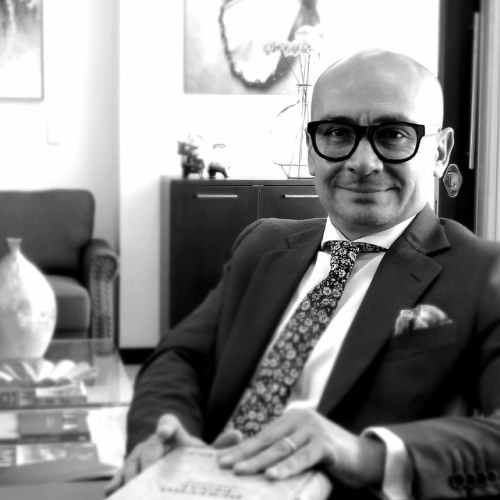


Xavier Andrade Castillo, is Professor of Criminal Law and Criminal Procedure in the Law School at the San Francisco de Quito university, Ecuador
His partner in Virtual Exchange is Erika Brooke, Associate Instructional Professor in Criminology in the Department of Sociology and Criminology & Law at the University of Florida.
How the collaboration began
“We met through Paloma here at UF,’ says Erika. “She had a connection and was aware I was searching for a partner for my virtual exchange idea. I subsequently met up with Xavier, who graciously accepted my offer. And we’ve been partners in crime running our VE for six semesters now!
“I started our VE with great enthusiasm,’ chimes in Xavier, ‘as this was truly an innovative proposal for me and my students. I had no prior contact with Erika before this time, nor did I know her subjects and topics. Despite this, I loved the idea and the innovative approach in university teaching. That’s why I accepted.
“Xavier graciously followed the lead and here we are with our continuing collaboration intact and thriving!”
Student composition in the VE
“My students are criminology majors, and I’ve traditionally implemented the VE project in my Careers in Criminal Justice course. However, I have also successfully adapted the collaboration for another course I teach entitled ‘Prisons and Jails,” explains Erika.
Xavier continues: “My students are preparing to become lawyers with a sub-specialisation (minor) in criminal law. They take compulsory subjects of the law degree, but also take electives related to the entire specialisation.”
For Erika’s students, this class is mandatory and for Xavier’s students, they take it for extra credits.
Erika compiled lists of both their groups of students and created working groups of roughly four, depending on the class size. The students were tasked with reaching out to each other, exchanging emails and sending out introductory videos. That was the start of their virtual exchange journey together.
Time management and communication
Erika says that their project lasts for 12 weeks, including bi-weekly discussions, scaffolded onto topics from the course.
The introductions phase of the project first allows the students to put their time-management skills into practice, as they need to set up their own meetings throughout the exchange.
They add fun facts and future plans. But also importantly, they need to include a plan for meet-ups and decide how they are going to communicate with each other. Will they use email, or WhatsApp messaging for example? From the start of their online collaboration, this needs to be established.
The subsequent segment of the virtual exchange involves discussion around the topics.
Erika says: “Xavier and I set up the discussion questions and topics to reflect what we are doing in class. We give them these to help guide them.
We talk about the components, system issues and perceptions of the law and who violates the law. Xavier also added in some scenarios to include offenders and how we perceive them according to their role in the crime. Would it be different if they were the main offender versus if they were the one driving the getaway car for example? We discuss whether corrections should be purely retribution focused or more rehabilitative in nature. So, they dive into the different facets of the justice system and analyse, assess and reflect the different practices in their own systems while comparing it with one abroad.”
Similarities and Differences in the justice systems
Xavier says: “I asked my students to be very clear about language and how they use it, as lawyer language can be very technical. And our cultures are quite different. My students’ first observation was how different our perceptions of our respective justice systems are. They had different ideas about crime and punishment and how the police work. The police here in Ecuador are not as respected as they are in the US. However, we had issues in common like corruption. And we share an adversarial system.“
Erika concurs. “I think Xavier’s students were surprised at our court system and how we use a jury system. That really made both cohorts of students reflect between a judge vs jury system and how that might impact the outcome of a trial.”
Xavier says this type of exchange between students from different cultures always brings knowledge and breaks down myths. Friendships are built and biases re-evaluated. “It was a real adventure.”
Main takeaways from the virtual exchange collaboration
Both Erika and Xavier’s students maintained some of the relationships beyond the exchange and continued networking after.
Erika points out that iterations occurred at the tail-end of the pandemic and two major US elections as well as significant prison riots in Ecuador.
“In this way, these events provided context for our virtual exchange and forced us to look at the US position in the global environment. Not only that, but they provided real world perspectives by looking at the riots in Ecuador in a way that they could not glean from the news.”
Challenges
Xavier and Erika keep their virtual exchange updated for each iteration, adapting and using events in their respective countries to provide authenticity to the discussions. All the student issues have been ironed out by this point.
Erika says that the main point at issue for the students was time management and the fact they tend to wait till last minute! And those pesky time zone differences can really throw a spanner in the works!
“It was a learning lesson in a good way for them to experience real-world issues.”
Xavier says one of the main challenges has been to maintain the virtual exchange over several semesters, and to adjust the themes accordingly. Schedules and evaluation technology also need streamlining.
The role of VE training
Erika had undertaken the training offered at UF, which, she says, helped with structure as the goal of the training was to build the VE. In this way, she was able to go to Xavier with a plan in place which they were able to run with. Without the training, everything would have taken much longer.
The best advice? “Give yourself grace,’ says Erika, ‘and allow for the bumps. But the hard work really pays off. The first semester was the toughest, but now after six semesters, it has got easier. Don’t be afraid to adapt to other courses too, as it can all work out with minor adjustments.”
“When you feel enthusiastic, you just need to take the risk!” says Xavier. “We’ve connected our cultures and our curricula and it’s all been worth it.”
